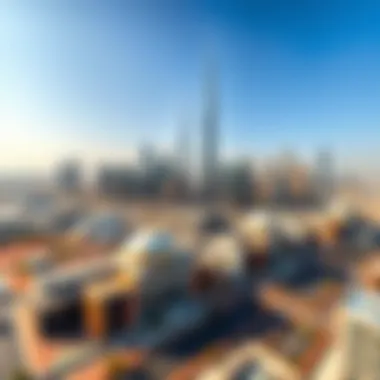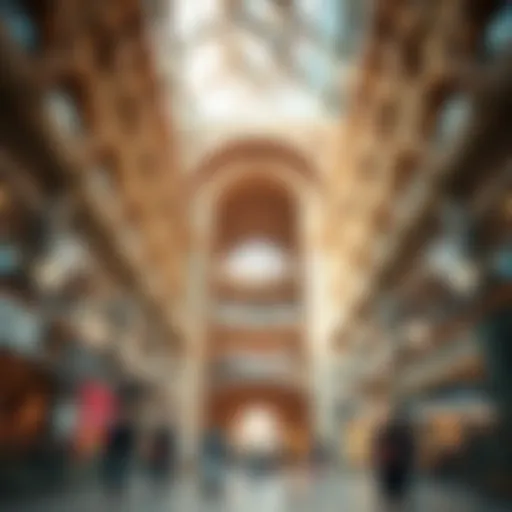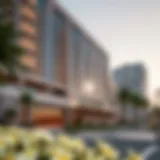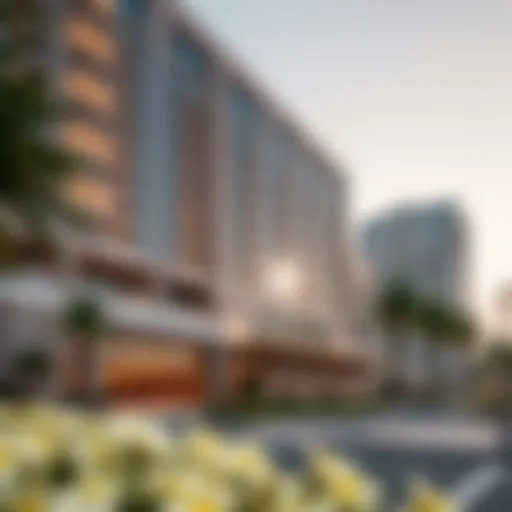Insights and Trends in Dubai's Real Estate Market


Intro
Navigating the real estate landscape in Dubai presents a unique blend of opportunities and challenges, both for seasoned investors and first-time homebuyers. The city, known for its skyscrapers and luxury developments, has evolved into a hub that attracts global interest. This comprehensive overview aims to shed light on the shifting dynamics of Dubai's property market, unraveling current trends, various property types, and the factors contributing to investment decisions.
In recent years, Dubai's real estate market has shown resilience, adapting to changes in both local and international demand. From opulent villas in Palm Jumeirah to high-rise apartments in Downtown Dubai, the diversity is astounding. Understanding these nuances not only assists buyers in making informed choices but also helps investors gauge where the market is headed.
Recent reforms and governmental regulations have further enhanced the investment climate. Whether you are looking to purchase a property or simply seeking insights into the market, this guide will serve as a practical resource, equipping you with the knowledge needed to thrive in this vibrant city. In the following sections, we will delve into:
- Current trends shaping Dubai’s real estate market
- Future forecasts for property prices and demand
- Different types of properties available, including residential and commercial
- Opportunities and challenges within these segments
By synthesizing data and expert opinions, this article provides a rounded perspective on the state of Dubai's real estate, ensuring you are well-prepared for your next venture.
Prelims to Dubai's Real Estate Landscape
Dubai's real estate market has matured into a vibrant ecosystem that warrants exploration for anyone with an interest in property investment. It is not just about buildings and plots; the landscape reflects the city's aspirations, its economic resilience, and its cultural mosaic. This section serves as a launching pad for understanding the unique characteristics that shape Dubai's real estate realm.
The significance of this topic cannot be overstated. Investors, homebuyers, and industry professionals alike find themselves navigating through a labyrinth of options and regulations. Having a finger on the pulse of Dubai's market dynamics helps stakeholders make informed decisions that align with their financial goals.
Real estate in Dubai is not merely transactional; it's about vision. The city is known for its striking architecture and ambitious development projects that attract global attention. For instance, the Burj Khalifa stands tall not only as a symbol of luxury but also as a testament to what Dubai aims to achieve. Understanding the landscape means grasping the ambition that drives these developments.
Key elements to consider include:
- Market Trends: Recognizing fluctuations informs buying and selling strategies.
- Investment Opportunities: Knowledge of emerging areas can lead to profitable ventures.
- Regulatory Considerations: Being informed about ownership laws helps avoid potential pitfalls.
- Cultural Nuances: Understanding the local customs and demographics enriches investor perspectives.
This introduction sets the stage to dive deeper into Dubai's real estate sector. As we peel back the layers, the analysis will reveal how historical contexts, current trends, and future predictions come together to create a rich tapestry that investors and homebuyers can navigate with confidence.
"In the realm of real estate, knowledge is not just power; it is the compass that guides you through uncharted waters."
The unique face of Dubai's real estate is a blend of tradition, innovation, and ambition. It is a space where the past collides with the future, demanding a thorough understanding for those wishing to make their mark in this dynamic field. As the following sections unfold, readers will gain access to essential insights that will enhance their engagement with the real estate landscape in Dubai.
Historical Context of Real Estate in Dubai
Understanding the historical context of Dubai's real estate market is essential for anyone considering investing in this vibrant city. It provides a framework to analyze how the market has evolved over time, which in turn helps investors and homeowners make informed decisions based on past performance and future trends. This historical perspective is not just about numbers and years; it's about understanding the cultural, economic, and social shifts that have shaped Dubai into a major global player.
Evolution of Dubai's Property Market
Dubai's property market has witnessed a remarkable evolution since the late 20th century. Initially, property development was modest, focusing primarily on local needs. The discovery of oil in the 1960s acted as a catalyst for transformation. Money flowed into the emirate, allowing for incredible infrastructure projects and luxury developments. In the late 1990s, the government initiated policies to encourage foreign investment and attract global talent. The introduction of freehold properties in 2002 was a game changer; it allowed expatriates to buy property for the first time, leading to a construction boom.
By the mid-2000s, Dubai was marked by iconic skyscrapers and sprawling residential complexes. Neighborhoods like Dubai Marina and Downtown Dubai emerged, boasting luxury amenities and waterfront views. However, the global financial crisis of 2008 was a turning point. The real estate market faced significant challenges, leading to a period of correction that lasted several years. Prices dipped, yet this downturn paved the way for more regulatory measures aimed at stabilizing the market.
As of now, the market is once again on a growth trajectory, fueled by a vision of diversifying the economy. The expo 2020 fate, which showcased Dubai to the world, has added fuel to this upward trend.
Impact of Global Trends on Local Markets
Several global trends have profoundly affected Dubai's real estate landscape. For one, the increasing movement toward remote work has changed how people view living arrangements. Expats are looking for homes that offer more space and are often considering regions that they may not have in the past. The pandemic accelerated this trend, revealing that individuals can work effectively from various locations.
Furthermore, the influx of tech companies into Dubai has created a demand for properties that support innovation hubs. Young professionals are drawn to areas with good connectivity, modern amenities, and a vibrant social scene.
The focus on sustainability has also found a place in the real estate realm. Many developers are now prioritizing energy-efficient designs to align with global climate goals. Projects featuring smart technology are becoming increasingly popular, further shaping the market.
"A robust understanding of both historical and global factors positions investors to anticipate shifts and align their strategies accordingly."
In summary, the historical context of Dubai's real estate market reveals a dynamic landscape influenced by local developments and international events. For potential investors and homeowners, recognizing these trends and the evolution of the market can provide invaluable insights for navigating the ever-changing real estate terrain.
Current Market Trends
Understanding current market trends is pivotal for anyone navigating the real estate scene in Dubai. Whether you are an investor eyeing promising opportunities or a homebuyer hunting for that perfect place, grasping how these trends shape the market can save a lot of headaches down the line. The Dubai property market is like a chameleon; it adapts to global influences and local shifts, making it essential to stay well-informed.
Market trends can impact property values, rental rates, and neighborhood desirability. An upward trend in the market often signals growing demand and increased prices, while a downturn may hint at oversupply and decreased values. That’s why staying updated about what’s hot and what’s not can truly pay off for all stakeholders involved.
Analysis of Supply and Demand Dynamics
The delicate balance between supply and demand is at the heart of any real estate market. In Dubai, this relationship has its twists and turns. Over the past decade, we’ve seen a significant influx of new developments, from high-rise apartments to sprawling villas. This boom has created a vast array of choices for prospective buyers and renters.
However, it's not all sunshine and rainbows. The rapid pace of development has sometimes led to oversupply in certain areas. For instance, neighborhoods like Dubai Marina were once coveted, but initial overbuilding resulted in a saturated market with many units left vacant.


On the other hand, districts like Downtown Dubai continue to witness robust demand due to their desirable locations near major attractions. Factors influencing this demand include:
- Population Growth: An ever-increasing population looking for housing puts pressure on available properties.
- Employment Opportunities: As companies set up shop in Dubai, especially in tech and finance, more people are drawn into the emirate.
- Tourism Trends: Dubai's appeal as a tourist hotspot leads to demands for rental properties, boosting investor interest.
- Lifestyle Choices: Changing preferences, such as a shift toward sustainable living and smart homes, influence what types of properties are in demand.
Important to note is that basic economic principles dictate that when demand outstrips supply, prices increase, and when the opposite occurs, prices tend to stagnate or decrease. Keeping a keen eye on these dynamics is crucial for making sound decisions in Dubai's evolving market.
Role of Foreign Investment
Foreign investment plays a significant role in shaping Dubai's real estate landscape. As one of the most cosmopolitan cities in the world, Dubai attracts a diverse range of investors from every corner of the globe. This diverse influx not only impacts the property prices but also enriches the architecture and culture of the city.
There are several key points to consider regarding foreign investment:
- Regulatory Environment: The UAE has established favorable laws that encourage foreign ownership of properties. This supportive framework has attracted many non-residents to invest in Dubai, especially since they often see it as a safe haven for their capital.
- Global Economic Factors: Changes in global economics and politics can influence where foreign investments land. For instance, fluctuating currencies can make Dubai property more attractive to investors whose currencies aren't as strong.
- Return on Investment: The potential for high ROI in rental properties appeals to many foreign investors. With Dubai's tourism booming and expatriates flocking for work, the demand for rental properties continues to rise, which could translate to higher yields.
- Market Sentiment: The perception of Dubai as a booming real estate market attracts investors. A positive outlook can drive up interest, while negative news could drive investors away.
Types of Properties Available in Dubai
When considering Dubai's real estate market, understanding the types of properties available here is essential. Each type serves a unique purpose, catering to diverse needs and investment strategies. Whether you are an investor hunting for the next big opportunity or a homebuyer seizing a slice of this vibrant metropolis, knowing what's out there can help make well-informed choices. This section will explore residential, commercial, and luxury properties in detail, offering insights that matter.
Residential Properties Overview
Residential properties in Dubai come in varied forms, tempering the expectations of homebuyers. From cozy villas in serene neighborhoods like Arabian Ranches to high-rise apartments in bustling districts like Dubai Marina, options are plentiful.
Key Points about Residential Properties:
- Diversity of Style: Properties range from contemporary designs to classic Arabic architecture, allowing homeowners to pick their preferred aesthetic.
- Amenities Galore: Many residential developments offer appealing amenities like swimming pools, gyms, and parks, enhancing livability.
- Investment Potential: Investing in residential properties can yield rental income, especially in areas with high demand.
As investors and families contemplate their choices, the landscape of Dubai's residential properties continually evolves. This means flexibility in housing and attractive options for every budget.
Commercial Real Estate Options
In addition to residential opportunities, commercial real estate has become a cornerstone of Dubai's economy. The demand in this sector reflects the city’s growing status as a business hub.
Highlights of Commercial Real Estate:
- Types of Spaces Available: Options include office leases in skyscrapers downtown, retail spaces in shopping centers, and warehouses in logistics parks.
- Business Growth: The rise in small to medium enterprises is driving up demand, making investing in commercial real estate quite attractive.
- Flexible Regulations: Dubai's willingness to adopt business-friendly policies adds to its appeal for commercial investments.
Investors keen on commercial properties must keep a pulse on market trends. Understanding shifting dynamics can offer burgeoning opportunities ripe for harvesting.
Luxury and High-End Developments
When it comes to luxury properties in Dubai, the market is nothing short of extravagant. High-end developments encapsulate opulence, attracting affluent buyers from across the globe.
Aspects to Consider:
- Distinctive Offerings: Properties may include penthouses with breathtaking skyline views, villas with private beaches, or quirky homes with artistic flair.
- Exclusive Amenities: Many luxury developments come with top-notch facilities such as private pools, yacht docks, and concierge services, ensuring that buyers enjoy a lavish lifestyle.
- Prestige Factor: Owning a luxury property in Dubai enhances status, making these investments particularly desirable.
Luxury doesn't just represent a home; it signifies a desirable lifestyle and creates an experience that many seek to access.
Financing Options for Buyers
Buying property in Dubai isn’t just about finding the right location; it’s also about securing the right kind of financing. Understanding the options available to potential buyers is pivotal, as it directly impacts the overall investment strategy and financial health of an individual or company. In a market as dynamic as Dubai’s, knowing what's out there can be the difference between a good deal and a regrettable one. This section aims to illuminate financing avenues, ensuring that buyers are well-prepared to navigate their real estate journey with confidence.
Mortgages and Loans in Dubai
When it comes to financing property, mortgages are often the first choice for many buyers. They enable individuals with varying financial backgrounds to invest without immediately tying up all their available capital. The mechanics of mortgage lending in Dubai can be both straightforward and intricate, depending on the buyer’s situation.
A typical mortgage in the UAE can be structured in several ways, involving fixed or variable interest rates. A fixed-rate mortgage offers consistency, ensuring the payments don’t fluctuate over time, whereas variable rates can change based on market conditions. For many, the allure of a fixed rate protects against sudden economic shifts, akin to having an umbrella in a sudden downpour.
Here are some essential details regarding mortgages in Dubai:
- Loan-to-Value Ratio (LTV): Buyers typically can secure up to 80% LTV for residential properties, meaning a down payment of at least 20% is often required, but this varies for different types of properties.
- Eligibility: Factors that influence eligibility include residency status, age, income, and credit history. Non-residents, for example, may face stricter conditions.
- Duration: Mortgages are generally offered with tenures ranging from 15 to 25 years, making homeownership not just a dream but a feasible plan for many.
"Investing in a mortgage can turn a house into a home while also building equity over time."
It’s essential for buyers to shop around, comparing interest rates and terms from different banks and financing institutions. As with many things, the devil is in the details, so understanding all the terms upfront will save potential headaches down the road.
Alternative Financing Strategies


While traditional mortgages often take center stage, there are alternative financing strategies that buyers may consider, especially those looking to sidestep some complexities associated with bank loans. In a hustling market like Dubai, creativity in funding options can go a long way.
Some noteworthy alternatives include:
- Cash Purchases: For those fortunate enough to have the means, paying in cash can simplify the buying process entirely. It circumvents the lengthy approval process of banks and may give buyers leverage when negotiating prices.
- Developer Financing: Some developers offer in-house financing plans where buyers can pay in installments while the property is being built. This can ease financial pressure and attract those who may not qualify for a conventional mortgage.
- Partnerships and Joint Ventures: Investors looking to enter the market without shouldering the entire burden alone may consider partnering with friends or family. This not only share the financial load but can also make investing less risky.
- Lease-to-Own Options: A growing trend in Dubai is the option to lease a property with the potential to buy it later. This arrangement allows buyers to test out a property and neighborhood before fully committing.
Neighborhood Insights
Understanding the significance of neighborhood insights is crucial for anyone looking to invest or settle in Dubai's dynamic real estate market. The choice of a neighborhood can greatly influence property values, lifestyle, and overall satisfaction of residents. Each district offers its unique flavor, amenities, and community dynamics, making it essential to dive deep into these aspects.
From a practical standpoint, knowing the neighborhood helps potential buyers gauge their commute times, proximity to schools, hospitals, and entertainment hubs. Furthermore, this knowledge enables investors to identify areas with high growth potential or those experiencing gentrification. By exploring different neighborhoods, buyers can make informed decisions tailored to their lifestyle needs.
Exploring Popular Districts
Dubai boasts a plethora of districts, each with its own character and appeal. For instance, Downtown Dubai is often regarded as the bustling heart of the city. Home to the iconic Burj Khalifa and Dubai Mall, this area attracts tourists and residents alike. Property here tends to command high prices, given its location and access to city attractions.
In contrast, Dubai Marina offers a more relaxed yet vibrant atmosphere, characterized by waterfront views and leisure activities. This area has seen substantial foreign investment, particularly among expatriates who want a lifestyle combining urban living with recreational pursuits. You might find luxurious apartments and lively nightlife that appeals to young professionals.
Other districts such as Jumeirah Lake Towers and Arabian Ranches provide distinct living experiences. While Jumeirah Lake Towers offers high-rise living with a cosmopolitan flair, Arabian Ranches goes for a suburban feel with family-friendly amenities. Buyers often evaluate these aspects based on personal preferences and their long-term goals.
Emerging Areas of Interest
While established neighborhoods have their perks, emerging areas like Dubai South and Mohammed Bin Rashid City deserve attention. Dubai South, primarily designed around the Expo 2020 venue and the new Al Maktoum International Airport, is framing itself as a future hub filled with residential, commercial, and logistical developments. Investors are eyeing this area, given its ambitious plans and potential for growth.
Meanwhile, Mohammed Bin Rashid City serves as an attractive option for affluent individuals seeking expansive living spaces. This area promises upscale living with a mix of luxury villas and community-first planning. Its integration of green spaces and leisure facilities make it a prime choice for families.
As these neighborhoods continue to develop, they open up new avenues for investment. Buyers need to keep an eye on infrastructure developments and amenities planned in these areas. Following the evolution of these districts will provide insights into the future trajectory of Dubai's real estate scene.
"Investing in emerging neighborhoods can potentially yield higher returns, especially when development aligns with population growth and infrastructure enhancements."
Regulatory Framework in Dubai Real Estate
The regulatory framework governing Dubai's real estate market is pivotal in shaping how the sector operates. Understanding these regulations not only helps investors and homebuyers navigate the complexities of property transactions but also provides insight into the potential risks and rewards involved. This framework is designed to ensure transparency, protect the rights of property owners, and maintain market stability, all of which are essential in attracting both local and foreign investments.
Understanding Ownership Laws
In Dubai, ownership laws are particularly distinguishing. The Freehold property ownership allows foreigners to own properties on a freehold basis in designated areas, which has sent waves of interest through the expatriate community. Conversely, Leasehold ownership permits individuals to lease property for a specified number of years, typically ranging from 30 to 99 years, reining in the ownership in a way that often favours native residents.
Some notable aspects of ownership laws include:
- Regulatory Authority: The Dubai Land Department (DLD) is the main governing body that oversees real estate transactions, ensuring compliance with local laws and regulations. They also maintain the property registry, providing a layer of security for owners.
- Transparency: Transactions are usually documented via official contracts, which safeguard both buyers and sellers. Laws also stipulate how transactions should be registered, emphasizing legal protection through structured processes.
- Property Rights: These laws make it clear that property rights are enforceable, which helps in resolving disputes and maintaining order in the property market. Buyers can confidently invest, knowing their rights will be upheld.
Recent Legislative Changes and Implications
Recently, there have been several legislative changes aimed at improving the investment climate and addressing certain challenges within the real estate market. For instance:
- Introduction of Property Ownership for Expats: Legal reforms have expanded Freehold ownership areas, allowing more expatriates to invest in Dubai's real estate, consequently pumping life into the market.
- Regulation of Rental Laws: Updated rental laws designed to protect tenant rights while ensuring landlords are fairly compensated, have garnered attention. These regulations help in clarifying the rights of both parties, thereby fostering a fair market dynamic.
- Sustainability Regulations: An increasing emphasis on sustainability has seen laws come into play, requiring new developments to adhere to green building standards. This not only attracts environmentally-conscious investors but also complements Dubai's vision of becoming a global city that prioritizes sustainability.
A well-defined legal framework may be the key to unlocking potential in Dubai's property market, ensuring a balanced and fair system for all participants, be it investors, developers, or tenants.
By staying abreast of these laws and recent changes, investors and homebuyers can make informed decisions that align with their long-term goals while navigating the promising yet intricate landscape of Dubai's real estate market.
Sustainability and Innovation in Dubai Real Estate
The real estate market in Dubai is undergoing a transformation, and at the forefront are sustainable practices and innovative technologies. These elements are essential not just for the environment but also for making smart investments that hold value long-term. As the city becomes more popular, the focus on creating eco-friendly structures is increasing, which is a positive development that benefits situated communities, investors, and future generations.
Green Building Initiatives
Green building initiatives are paving the way for a more sustainable future in Dubai. These projects aim to minimize the environmental footprint while maximizing efficiency and sustainability. Developers are focusing on several key areas:
- Energy Efficiency: New buildings incorporate renewable energy sources, such as solar panels, to reduce reliance on non-renewable energy.
- Water Conservation: Smart irrigation systems and water recycling methods are now standard practices.
- Sustainable materials: Builders opt for materials that have minimal environmental impact.
By 2030, Dubai's sustainability efforts aim to cut 30% of energy consumption, which could save a pretty penny for residents and investors alike. The trend towards creating buildings that are not just habitable but also environmentally responsible is critical. Consider the benefits:
"A sustainable building investments not only helps the ecosystem but also proves beneficial for residents through lower utility bills."
This blend of responsibility and efficiency is making Dubai a leader in green architecture. People see the value in sustainable living, pushing developers to be increasingly innovative in their construction methods.


Technological Advancements in Property Management
As Dubai’s real estate continues to grow, the utilization of technology in property management is becoming indispensable. Landlords are now employing various technologies to enhance service delivery, streamline operational processes, and improve tenant satisfaction.
Important advancements include:
- Smart Home Technology: Features like automated lighting and security systems are becoming commonplace, providing convenience and added security.
- Property Management Software: Platforms are making it easy for landlords to manage everything from rent collection to maintenance requests, optimizing the entire rental experience.
- Virtual Tours and Augmented Reality: These technologies enable potential buyers to get a feel of a property before even stepping foot in it, further diversifying how properties are marketed.
These innovations not only simplify property management tasks but also cultivate a culture of transparency and ease of access for tenants and landlords alike.
The trajectory for sustainability and innovation in Dubai’s real estate market looks promising. With the alignment of eco-friendly initiatives and cutting-edge technology, investors and homebuyers stand to gain not just immediate benefits but also contribute to a healthier planet. In essence, embracing these can lead the way to a flourishing future in the vibrant landscape of Dubai.
Challenges Facing the Real Estate Sector
The real estate market in Dubai is not just a playground for luxury investments; it’s a complex landscape that grapples with unique challenges. Addressing these challenges is vital for anyone looking to invest or engage in Dubai’s property market. Understanding the obstacles can help investors, homebuyers, and real estate agents make smarter decisions, and potentially mitigate risks. The current challenges can not only affect property valuation but also influence government policies and market dynamics, making them a crucial area of focus.
Market Volatility and Economic Factors
Market volatility is an inherent risk in any real estate sector, and Dubai is no exception. Economic shifts can dramatically alter the landscape, often leaving investors in a lurch. Factors such as oil price fluctuations, global economic downturns, and even geopolitical tensions can create a domino effect that impacts property values.
For instance, the tourism sector plays an important role in Dubai’s economy. If tourism dips due to global unrest or health pandemics, the ripple effect on rental yields can be swift and severe. Potential buyers might balk at the idea of investing in property during uncertain times, leading to a stagnation that exacerbates the problems.
In times of rapid growth, however, the market may also experience overheating, making property prices soar to unaffordable levels. Consequently, pushing out potential buyers who can’t keep pace with escalating rates. Thus, it’s a delicate balancing act where understanding economic indicators becomes crucial.
Competition and Oversupply Issues
Yet another challenge presenting itself in Dubai’s real estate market is competition and oversupply of properties. Years of aggressive development have led to an abundance of residential and commercial units. While supply was once seen as a sign of prosperity, it has begun to create a paradox of choice that sometimes overwhelms buyers.
In 2021, there were reports indicating that certain districts had nearly 30% more properties than demand suggested. Potential investors may suddenly find themselves sifting through a crowded field of options, only to discover that many properties are being sold at deep discounts amid increasing vacancies.
This oversupply not only dampens prices but also leads to fierce competition among developers. They often resort to incentives like prolonged payment plans or discounts to lure clients, further straining the profit margins for existing property owners. In turn, this results in stiffer negotiations and, in some cases, a fear of long-term investments as market health becomes a question mark.
Property buyers should keep a keen eye on market dynamics, balancing the lure of lower prices with the risk of illiquid assets. Navigating these complexities requires not just market knowledge but also an understanding of future trends and the impacts of external economic factors.
"The vibrancy of the Dubai real estate market is often overshadowed by its inherent challenges, making it imperative for stakeholders to stay informed and adaptable."
In summary, while Dubai offers tantalizing opportunities in real estate, it is not without its fair share of hurdles, both in terms of economic stability and market saturation. Investors and homebuyers must tread carefully, keeping these critical issues in mind as they chart their course forward in this multifaceted landscape.
The Future of Real Estate in Dubai
Looking ahead, the future of real estate in Dubai holds significant importance for a variety of stakeholders, including investors, homebuyers, agents, and developers. Understanding the forthcoming trends and developments is crucial in navigating a market that has been marked by its rapid evolution. This section sheds light on diverse facets that shape the future of this vibrant property landscape.
Predictions for Market Growth
Forecasts for market growth in Dubai are often optimistic, driven by several key elements. Firstly, the ongoing infrastructural expansion plays a vital role. Projects like the Expo 2020 legacy developments continue to draw attention and investment. Moreover, the Dubai 2040 Urban Master Plan aims to enhance livability and create new opportunities, indicating stable demand in various segments.
- Population Growth: With the population steadily increasing, there is a rising need for housing solutions. This paints a favorable picture for residential real estate.
- Foreign Investment Incentives: Initiatives to attract foreign investors, like long-term residency visas, could elevate property values in sought-after neighborhoods.
- Technological Integration: As smart home technologies and eco-friendly building practices become prevalent, properties that incorporate these features may see enhanced appreciation potential.
Market analysts suggest an average annual growth rate of about 4-6% in the residential sector over the coming years. As developers gear up for forthcoming projects, they will likely incorporate more mixed-use developments, reflecting changing lifestyle choices that promote convenience and accessibility.
"Anticipated growth in the Dubai real estate sector is grounded in solid policy frameworks and innovative urban planning strategies."
Potential Policy Changes and Their Effects
Policy adjustments strive to maintain the market's vitality while ensuring sustainable growth. As the authorities review existing regulations, several potential changes could have profound impacts on the real estate landscape:
- Increased Transparency: Improving transparency in property transactions could help build investor confidence. Standardizing processes will attract more foreign buyers, enriching the market.
- Taxation Revisions: Changes in property tax rates could sway investment decisions; lower taxes might make the market more appealing, while higher rates could deter potential buyers.
- Regulatory Simplifications: Streamlining the approval processes for new developments may lead to a faster project turnaround, addressing supply constraints while advancing economic objectives.
- Green Building Incentives: With sustainability at the forefront, government incentives for eco-friendly construction could reshape the property types in higher demand, aligning with global trends.
Finale
In the dynamic arena of Dubai's real estate market, understanding the nuances and implications is not just beneficial, it's essential. This article has traversed the ins and outs of the market, highlighting key components such as trends, investment strategies, and regulatory conditions. For investors and homebuyers alike, solidifying their grasp on these aspects can lead to informed decisions, improving the likelihood of favorable outcomes.
The real estate market in Dubai is influenced by various factors, including economic fluctuations, demographic shifts, and global investment patterns. It is imperative to consider the current climate when engaging in real estate ventures. Awareness of market volatility, interest rates, and upcoming regulatory changes can make a substantial difference.
Some key takeaways include:
- Importance of Research: Conducting thorough research on emerging neighborhoods and property types can uncover hidden gems and investment opportunities.
- Infusion of Technology: As Dubai steps into the future with smart city initiatives, being abreast of technological advancements in property management becomes a pivotal part of decision-making.
- Sustainability Considerations: Eco-friendly and sustainable developments are not just ethical choices; they are becoming increasingly desired in the marketplace.
"Real estate investing, even on a very small scale, remains a tried and true means of building an individual's cash flow and wealth."
— Robert Kiyosaki
Understanding these dynamics empowers stakeholders to adapt to changes swiftly. Whether navigating financing options or keeping an eye on legislation, being proactive often yields rewards. With a finger on the pulse of the market, investors can seize opportunities that align with their goals, paving the way for successful outcomes in Dubai’s vibrant property landscape.
In essence, this conclusion reinforces that knowledge is not just power — it's the guiding force behind making savvy real estate moves in one of the fastest-growing markets in the world.















